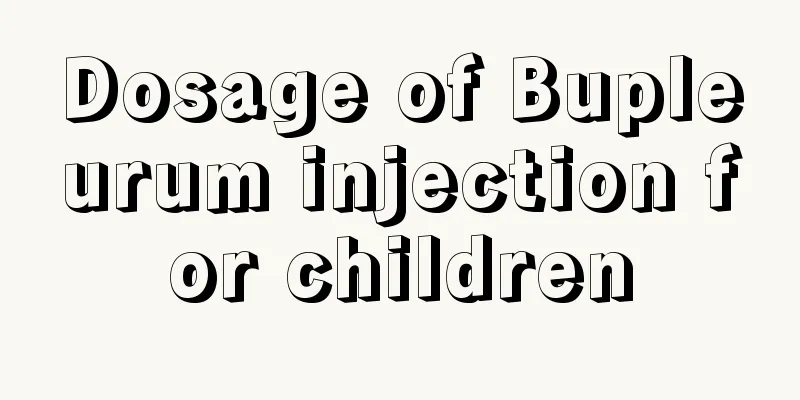Dosage of Bupleurum injection for children

|
Chaihu Injection is a medicine used to treat fever caused by colds, malaria and other diseases. Since the state stipulated on May 29, 2018 that Chaihu Injection is a drug "forbidden for children", the instructions for Chaihu Injection for pediatric use have been invalidated. Because the adverse reactions of Bupleurum Injection may cause anaphylactic shock in users, the state stipulates that Bupleurum Injection must be used in medical institutions with rescue conditions. 1. Pharmacological Action The main effects include antipyretic, anti-inflammatory, and immune enhancement. 1. Antipyretic: Intraperitoneal injection of 300 mg/kg of total volatile oil of Bupleurum chinense has a significant antipyretic effect on fever in rats induced by brewer's yeast suspension. There was no significant difference between the ear vein injection of Bupleurum injection 20ml/kg and the control group in cooling rabbit fever caused by typhoid and paratyphoid vaccines. Although intraperitoneal injection of 10 mg/kg Bupleurum injection had a cooling effect on fever caused by brewer's yeast in rats, there was no significant difference compared with the normal saline control group. Injection of 3 mg/kg of Bupleurum injection into the ear vein has a significant cooling effect on fever caused by the triple vaccine (pertussis, diphtheria and tetanus vaccine) in rabbits. 2. Anti-inflammatory: When 40 mg/kg and 240 mg/kg of total volatile oil of Bupleurum chinense were intraperitoneally injected, only the former dose had a significant anti-inflammatory effect on carrageenan-induced paw swelling in rats. Administration of 5.0 ml/kg Bupleurum injection into the ear vein antagonized the increased skin permeability of rabbits induced by xylene, but there was no significant difference compared with the control group. Intraperitoneal injection of 5.0 ml/kg of Bupleurum injection had a certain inhibitory effect on foot swelling and cotton ball granulation swelling in scalded rats, but there was no statistical significance. 3. Enhance immune function: Continuous intraperitoneal injection of 0.25 ml/day of Bupleurum chinense injection has a significant promoting effect on the formation of anti-sheep red blood cell antibodies in secondary immunized mice; intraperitoneal injection of Bupleurum chinense injection has no significant effect on the production of anti-tetanus toxoid in quadruple immunized rabbits, but has a significant enhancing effect on the inhibition of leukocyte migration. 2. Symptoms Relieve fever. Used for upper respiratory tract infections such as colds and influenza. Shuguang Hospital Affiliated to Shanghai University of Traditional Chinese Medicine and others used this product to observe the clinical efficacy of 64 patients with cold, fever and acute upper respiratory tract infection. The results showed that the total effective rate of this product was 75% to 80%. It can also alleviate the accompanying symptoms without any obvious side effects. The conclusion is that the fever subsided smoothly, there was no rebound after the temperature dropped, and the patient recovered quickly after the illness. 3. Usage and Dosage Injection: 2-4 ml each time, 1-3 times a day, intramuscular injection; 0.5-0.8 ml each time for adults. 4. Adverse Reactions Allergic reactions: skin flushing or paleness, rash, itching, difficulty breathing, palpitations, cyanosis, decreased blood pressure, anaphylactic shock, anaphylactic-like reactions, etc. Systemic reactions: chills, chills, fever, pain, fatigue, etc. Skin and its appendages: Various rashes may occur, mainly urticaria, dermatitis and pruritus. Respiratory system: breath holding, shortness of breath, difficulty breathing, etc. Cardiovascular system: palpitations, chest tightness, cyanosis, decreased blood pressure, etc. Neuropsychiatric system: dizziness, headache, numbness, vertigo, syncope, convulsions, confusion, etc. Digestive system: dry mouth, nausea, vomiting, abdominal pain, diarrhea, etc. Application area: pain, rash, itching, local redness, swelling, nodules, etc. 5. Notes 1. The adverse reactions of this product include anaphylactic shock. It should be used in medical institutions with rescue conditions. Users should have received anaphylactic shock rescue training. If allergic reactions or other serious adverse reactions occur after taking the medicine, the medicine must be stopped immediately and timely treatment should be sought. 2. Use the drug strictly according to its functions and indications as specified in the drug instructions. Use of the drug beyond its functions and indications is prohibited. 3. This product is an antipyretic and antipyretic drug and is not suitable for people without fever. 4. Use the drug strictly according to the usage and dosage recommended in the drug instructions, and pay special attention to not exceeding the dosage and not taking the drug continuously for a long time. 5. Before taking the medicine, you should carefully ask the patient's condition, medication history and allergy history. Use with caution if you have a history of drug allergy or allergic constitution. 6. Use with caution if you have a family history of allergies. 7. Improper storage of this product may affect the quality of the drug. The product should be carefully checked before use. It should not be used if any changes in the drug properties such as turbidity, precipitation, discoloration, crystallization, or any leakage or cracks on the bottle are found. 8. Mixing and compatibility are strictly prohibited, and combined medication should be used with caution. This product should be used alone and should not be mixed with other medicines. 9. It should be used with caution and strengthened monitoring for special groups such as the elderly, pregnant women, patients with abnormal liver and kidney function, and patients using Chinese medicine injections for the first time. 10. Strengthen medication monitoring. During medication, the drug reaction should be closely observed, especially in the first 30 minutes. If any abnormality is found, stop the medication immediately and adopt active treatment measures to treat the patient. |
<<: How to treat adenoid hyperplasia in children
>>: Myelin deficiency in children
Recommend
The dangers of eating too much
Generally speaking, the various organs of a baby&...
What are the treatments for keratitis in children?
Generally speaking, after children suffer from ke...
Can children eat Lingzhi?
Ganoderma lucidum is a very precious Chinese medi...
What to do if your four-month-old baby has indigestion
Babies need a normal diet to promote digestion an...
Why do children always drool?
Why do children always drool? Moms see their chil...
When does the baby's stomach develop?
The stomach is a very important organ in our body...
Is it really good to bathe a newborn baby every day?
Some mothers are very concerned about various iss...
Causes and hazards of small intestinal hernia in children
Parents with young children at home must be curio...
How many teeth should be replaced?
Nowadays, many families have only one baby. Many ...
What are the free pediatric vaccinations?
With the rapid development of the economy, the in...
What are the ways to improve your baby's immunity?
Immunity is the human body's defense mechanis...
Seven things that ancient parents should not blame their children for
1. Don’t blame in public: Don’t blame your child ...
How long does it take for a child to read after his pupils are dilated?
How long will it take for a child to be able to r...
How to clean baby's mouth
When the baby is young, parents must pay attentio...
What's wrong with the child's hunchback?
Hunchback is a common occurrence in our lives. Mo...









